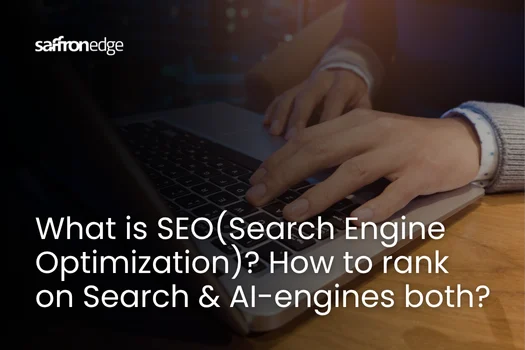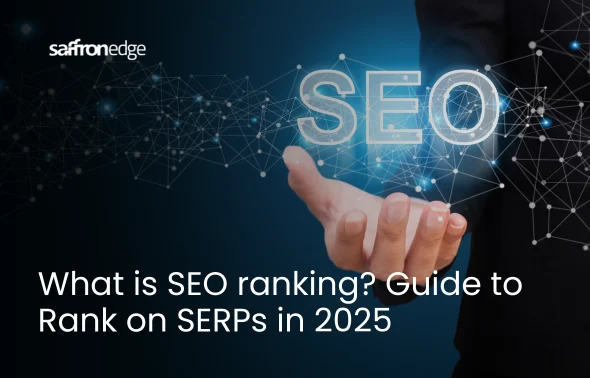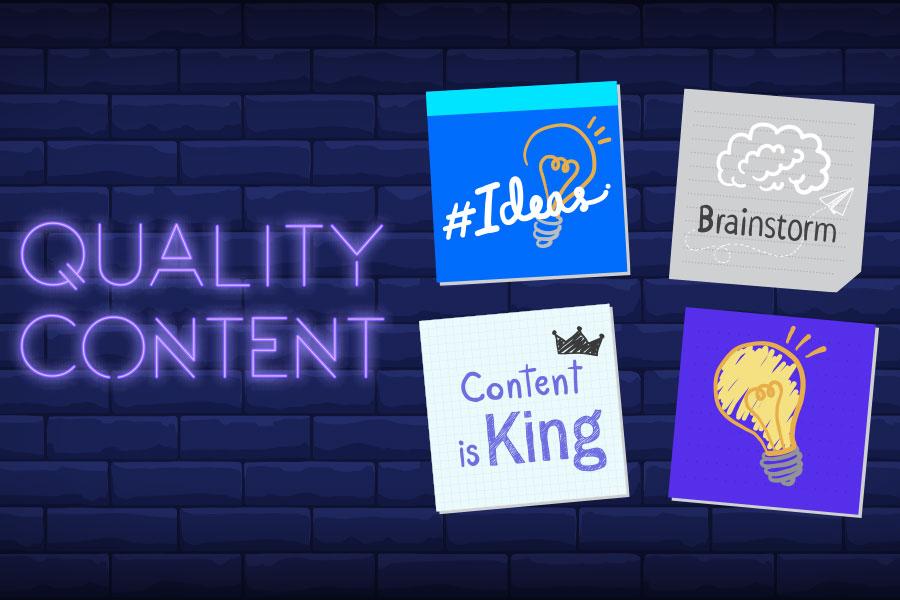Contents
- What Is SEO?
- Why SEO Still Makes Sense?
- SEO in 2025 and What’s Changing?
- How Search Works Today (2025 Version)
- 3 Primary Pillars of SEO
- Ranking on Search & AI engines is not impossible
- How AI is Transforming SEO?
- Paid Ads Alone Won’t Cut It in 2025’s AI Search
- New SEO Guidelines 2025
- Conclusion
- Kick-start Your Marketing Efforts With Our SEO Service
SEO (Search Engine Optimization) has always been about making your website visible to people searching for their problems online. But in 2025, SEO is no longer just about keywords and backlinks; it’s about optimizing for AI-driven search, answer engines, and generative responses.
With Google’s AI Overviews, chat-based search assistants like ChatGPT, and emerging answer engines like Perplexity or Claude, the way people search and how websites earn traffic has changed drastically.
The blog provides a comprehensive overview of SEO, covering all aspects of AI and suggesting its importance for brands today.
What Is SEO?
SEO (Search Engine Optimization) is the practice of improving a website’s visibility in search results on platforms like Google, Bing, and now AI-powered engines.
SEO redefines your brand’s presence in the digital market by improving your website’s visibility, including content and structure. It involves:
-
Technical SEO: Optimizing site structure, crawlability, speed, and schema.
-
On-Page SEO: Optimizing content, meta tags, and headings for relevance.
-
Off-Page SEO: Building authority via backlinks and brand mentions.
-
AI & Answer Optimization: Structuring content for AI summaries & zero-clicks.
SEO implementation works both ways; it enhances user search experience and helps your website rank by displaying content that meets users’ queries.
The primary goal of SEO is to ensure that a website ranks on the search results (SERPs) by optimizing links, adding relevant keywords to your content, targeting your demographic audience, and driving traffic that converts rather than just visits.
Why SEO Still Makes Sense?
SEO is still as alive as it can be. SEO matters more than ever in 2025 as:
-
Over time, the search pattern has evolved:
To stay ahead in this game of evolving search patterns, businesses have started adapting GEO, wherein they optimize their voice search systems to establish their presence on AI-powered search engines.
-
Personalization and a wider target of local SEO:
According to a data study by AISEO, 99% consumers read reviews online before using a service or product and 46% of monthly Google searches have local intent. Local SEO plays a dominant role in creating geo-specific search results to build a brand name.
-
AI-powered SEO tools are changing the market:
These tools act as the backbone of marketers, helping them automate many time-consuming tasks, from content optimization to link building that impacts their ranking on search results, allowing them to focus on content strategy.
SEO in today’s time is a holistic and user-centric approach that will not only survive in the coming years of digital marketing but thrive more than ever. Hence, it’s recommended for most businesses to elevate their SEO technology game.
SEO in 2025 and What’s Changing?
The shift in SEO has given rise to new practices like Answer Engine Optimization (AEO), which focuses on structuring content to appear in AI-generated answers, and Generative Engine Optimization (GEO), which ensures your brand is visible in generative search platforms like ChatGPT or Perplexity.With the traditional SEO approach no longer garnering traction, SEO shifted its service to a user-driven experience in which AI plays a huge role in transforming SEO services.
-
AI saves time by automating repetitive tasks.
-
Enhances data insights with content strategy.
-
SEO has shifted to a user-centric approach.
-
Technical SEO ensures the smooth functioning of a website.
How Search Works Today (2025 Version)
In 2025, SEO means optimizing not just for clicks but also for visibility in AI-generated responses, brand mentions, and conversational search answers.
1. Traditional Search + AI Overviews: Google still dominates, but ~20% of queries now show AI-generated summaries at the top of results (AI Overviews). These pull answers from multiple sources, meaning ranking #1 no longer guarantees traffic.
2. Rise of Answer Engines: Platforms like Perplexity and ChatGPT Search bypass traditional results, providing direct, conversational answers instead of lists of links.
3. Zero-Click Searches: More users get answers without clicking a website, through snippets, knowledge panels, or AI summaries.
4. Multi-Modal Search: People search using voice, images, and video queries (e.g., Google Lens, TikTok search), demanding SEO beyond text.
To stay visible online, brands use AEO strategies (optimizing for direct answers) and GEO (optimizing for generative engines), ensuring they don’t lose visibility when users bypass traditional results.A lot has changed in the SEO service over the past year. Further ahead, we talk about the key features and components of SEO that help you get traction on the web.
3 Primary Pillars of SEO
Even with AI involved, you cannot ignore the basics. SEO, which is about building a solid foundation that helps you achieve a lasting web presence, also has components that help you achieve the promised SEO results.
Let’s dive into the components of SEO:
Technical SEO:
Technical SEO could be complicated to accomplish or break down for better results, but it’s one of the most effective components.
It helps ensure that browsers or users read your content and explore your website. The major areas to consider here are:
-
Crawling: How well can a search engine explore your website? It’s important to get crawlability right to appear in search results. Crawlability is whether your content is accessible or discoverable on Google.
-
Indexing: Is there clarity on which pages should appear in the search engine? A disturbed indexing may lead to an entire section of your site not being considered, and a lack of a sitemap impacts your appearance in search results.
-
Mobile-Friendliness: Is the website user-friendly on mobile? It’s important to ensure the website’s responsiveness on all devices for a good user experience.
-
Page Speed: Do pages take time to load regardless of the gadget it's accessed on? Optimizing page loading time is vital for a smoother website experience.
-
Schema Markup: A website is search-friendly when it has structured data for engines to understand the content on pages.
The bigger your website gets, the more important these factors become.
On-Page SEO:
On-page SEO helps build relevancy and hierarchy, where optimization of individual web pages takes place to secure a ranking position in search results. The elements that come under it are:
-
Keyword Research and Optimization: It refers to discovering users’ intent with their pain points and using those words to optimize content and reach your target audience. These words not just drive traffic but also help you rank in search engines.
-
Meta Tags and Description: These encourage clicks, as you’ll see these keywords reflected in the title for that page. It displays your page title as relevant to the searched keyword.
-
Header Tag: These are extremely important as they add relevancy to your website page, reflecting what the content talks about or the base without having to read all and then discovering it’s of no use.
-
Image optimization: Every image that is uploaded on the website with content requires an alt text for better visibility on search engines. If it resonates with the image content, it’ll appear in the image section during search.
-
Internal Linking: Adding links between your pages, like associating your blog content with one of your service pages, is another way of letting Google discover your content.
It’s all-time work with every content you post, as it acts as the link between the supply (your content) and demand (users’ needs).
Off-Page SEO:
Off-Page focuses on building and enhancing a website’s authority and reputation by refining elements behind the scenes.
-
Link Building/Backlinks: It’s about reaching websites with high DA, representing their reputation on the web, and acting as a relevant source to acquire backlinks from their website. It found 43.7% of top-ranking pages in Google contain reciprocal links.
-
Social Media Marketing: Creating high-quality content by choosing the right platform that engages your target audience, adding substantial value to their time and interests.
-
Guest Post: Writing blogs for other websites and adding links to your site on the post, more like a brand promotion that adds value.
The performance of your off-page shows how well you communicate with the users; it’s like the more they talk and link to you, the more authoritative you become in the market.
Ranking on Search & AI engines is not impossible
200+ Fixes? 100+ Content? 50+ Team involved? 10+ POCs? Anyone can be tired of catching up to the new SEO trends. We do that for you. Our experts drive users to your website that actually convert into leads.
How AI is Transforming SEO?
Users have been adapting to new technologies, leveraging AI for search results on the web. They use voice or visuals to identify their issues and select the one that resonates with their problem or interest. But what’s actually happening?
-
Traffic Shifts to AI: 40% of search queries now resolve with zero clicks.
-
Visibility Beyond Google: Brands must be discoverable across multiple AI ecosystems.
-
Trust & Authenticity: With AI-generated spam rising, Google prioritizes real-world expertise (E‑E‑A‑T).
-
High ROI: Organic search still delivers the highest lifetime customer value compared to paid ads.
For example:
-
Users use it to get information about a product through a picture.
-
Users use AI to get a personalized comparison of products.
-
Users use it to make sense of complex topics.
AI’s role in SEO has changed the user experience and impacted paid marketing.
Paid Ads Alone Won’t Cut It in 2025’s AI Search
Generative AI is rewriting how paid campaigns perform. Discover why integrating SEO with PPC is the only way to maintain visibility, cut costs, and dominate AI-powered SERPs before competitors catch up.
New SEO Guidelines 2025
SEO Practices to Follow
With the ever-changing game of AI, it’s a must for you to follow these practices and stay at the top in the digital marketing game. Here’s how you can stay relevant and in demand:
-
E-E-A-T (Experience, Trust, Authoritativeness, and Trustworthiness) is a framework for content quality and credibility on AI-powered search results, showcasing expertise in citations and links to reputable sources in your content.
-
Content depth is essential for your audience to resonate, helping in market relevancy through detailed, authoritative information that answers fully.
-
User Experience is reflected in bounce rate and user time on page, which impacts your website ranking. Engaging users with interactive elements like creatives, quizzes, or videos is important.
-
Page Experience is enhanced through optimization of Core Web Vitals, mobile usability, and intuitive navigation. Hence, focusing on your site score is a must as a poor score leads to a drop in ranking.
-
AEO and GEO are no longer optional; they’re essential guidelines. AEO ensures your content is structured for AI models to extract precise answers, while GEO makes your brand discoverable in generative ecosystems like ChatGPT or Gemini.
-
Semantic Search focuses on the elements of the topic or entities rather than promoting the topic itself. If the topic is “SEO,” then we address related terms like “AEO,” “GEO,” or “content optimization.”
-
Snippets & AI Overviews are about structuring content with concise answers, lists, and schema markup to appear in both featured snippets and AI summaries.
Conclusion
Search is no longer about keywords and backlinks alone. In 2025, advanced SEO means designing content for AI-first; structuring, interacting, and optimizing for conversational outcomes. GEO, AEO, product-led pages, and strong brand signals will define visibility in the AI era. As these trends continue, brands that adapt will stay ahead.
TL;DR (Summary)
-
SEO now spans AI-driven interfaces, traditional SERPs, generative overviews, voice & visual search.
-
You must optimize for AI platforms using GEO, AEO, structured data, and interactive content.
-
Technical pages must be fast, accessible, and semantically structured.
-
Authenticity and real-world expertise (E‑E‑A‑T) matter more than ever.
-
Product-led pages and omnichannel content strategies are the future of discovery.
The SEO industry is filled with marketing companies running to poach clients. However, we are not poaching. All our deliverables in numbers speak volumes.
Kick-start Your Marketing Efforts With Our SEO Service
Start garnering attention that converts on the web and generates ROI. Build a credible web presence trusted by AI-powered search engines and users. Drive high conversions.
The ultimate marketing toolkit
Frequently Asked Questions
What exactly is SEO, and why does it matter in 2025?
SEO (Search Engine Optimization) is the process of improving your website’s visibility on search engines and AI-driven platforms. In 2025, SEO matters more than ever because search isn’t just text-based anymore; AI assistants, voice search, and generative results are reshaping how people discover brands.
How has SEO changed with AI and generative search?
Search is no longer about ranking #1 in traditional SERPs. AI models like Google Gemini and OpenAI Search generate direct answers, summaries, and contextual results. SEO now involves optimizing for AI responses (AEO) and generative engines (GEO) to remain discoverable.
What are the biggest differences between traditional SEO and modern SEO?
Traditional SEO focused on keywords and backlinks. Modern SEO prioritizes user intent, structured data, content quality, Core Web Vitals, and AI-readiness, ensuring content can be understood by both search engines and AI assistants.
Is SEO still relevant when paid ads dominate search results?
Yes. Paid ads offer instant visibility but are costly and temporary. SEO builds long-term, compounding visibility that continues driving traffic even when ad budgets stop. Plus, AI search blends organic and paid elements, making SEO crucial for balanced strategies.
Is SEO the same for AI-driven platforms and traditional search engines?
No. AI-driven platforms require context-rich, semantically structured, and conversational content that can be easily parsed and summarized by LLMs (Large Language Models), whereas traditional search still considers ranking signals like backlinks and keywords.
Related Blogs
We explore and publish the latest & most underrated content before it becomes a trend.

Subscribe to Saffron Edge Newsletter!

The ultimate marketing toolkit










